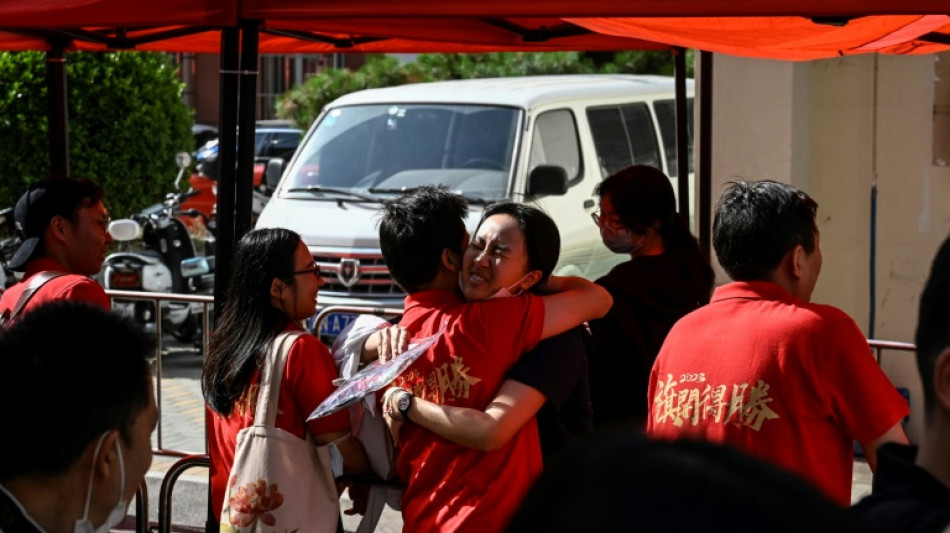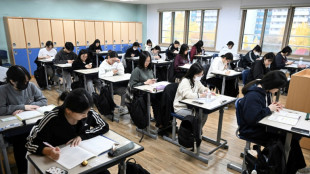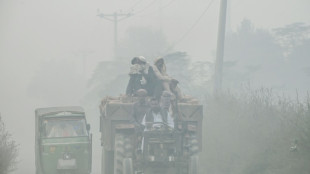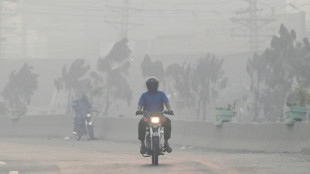
-
 UN climate chief urges G20 to spur tense COP29 negotiations
UN climate chief urges G20 to spur tense COP29 negotiations
-
Philippines warns of 'potentially catastrophic' Super Typhoon Man-yi

-
 Tens of thousands flee as Super Typhoon Man-yi nears Philippines
Tens of thousands flee as Super Typhoon Man-yi nears Philippines
-
Gabon votes on new constitution hailed by junta as 'turning point'

-
 Tens of thousands flee as Typhoon Man-yi nears Philippines
Tens of thousands flee as Typhoon Man-yi nears Philippines
-
Is Argentina's Milei on brink of leaving Paris climate accord?

-
 Fitch upgrades Argentina debt rating amid economic pain
Fitch upgrades Argentina debt rating amid economic pain
-
Trump picks Doug Burgum as energy czar in new administration

-
 At summit under Trump shadow, Xi and Biden signal turbulence ahead
At summit under Trump shadow, Xi and Biden signal turbulence ahead
-
Xi warns against 'protectionism' at APEC summit under Trump cloud

-
 Xi, Biden at Asia-Pacific summit under Trump trade war cloud
Xi, Biden at Asia-Pacific summit under Trump trade war cloud
-
Leftist voices seek to be heard at Rio's G20 summit

-
 Boeing strike will hurt Ethiopian Airlines growth: CEO
Boeing strike will hurt Ethiopian Airlines growth: CEO
-
US retail sales lose steam in October after hurricanes

-
 Spate of child poisoning deaths sparks S.Africa xenophobia
Spate of child poisoning deaths sparks S.Africa xenophobia
-
Comedian Conan O'Brien to host Oscars

-
 Gore says 'absurd' to hold UN climate talks in petrostates
Gore says 'absurd' to hold UN climate talks in petrostates
-
Global stocks struggle after Fed signals slower rate cuts

-
 China tests building Moon base with lunar soil bricks
China tests building Moon base with lunar soil bricks
-
Oil execs work COP29 as NGOs slam lobbyist presence

-
 Gore says climate progress 'won't slow much' because of Trump
Gore says climate progress 'won't slow much' because of Trump
-
'Megaquake' warning hits Japan's growth

-
 Stiff business: Berlin startup will freeze your corpse for monthly fee
Stiff business: Berlin startup will freeze your corpse for monthly fee
-
Dominican Juan Luis Guerra triumphs at 25th annual Latin Grammys

-
 Tropical Storm Sara pounds Honduras with heavy rain
Tropical Storm Sara pounds Honduras with heavy rain
-
TikTok makes AI driven ad tool available globally

-
 Japan growth slows as new PM readies stimulus
Japan growth slows as new PM readies stimulus
-
China retail sales pick up speed, beat forecasts in October

-
 Pakistan's policies hazy as it fights smog
Pakistan's policies hazy as it fights smog
-
Mexico City youth grapple with growing housing crisis

-
 Cracks deepen in Canada's pro-immigration 'consensus'
Cracks deepen in Canada's pro-immigration 'consensus'
-
Japan's Princess Mikasa, great aunt to emperor, dies aged 101

-
 Venezuela opposition activist dies in custody
Venezuela opposition activist dies in custody
-
Policymakers defend Fed independence amid concerns about Trump era

-
 Lebanon economic losses top $5 billion in year of clashes: World Bank
Lebanon economic losses top $5 billion in year of clashes: World Bank
-
Fed Chair calls US the best-performing major economy in the world

-
 Brother of late Harrods owner also accused of sexual violence: BBC
Brother of late Harrods owner also accused of sexual violence: BBC
-
New York to revive driver congestion charge plan, drawing Trump ire

-
 China's Xi arrives in Peru for APEC summit, Biden meeting
China's Xi arrives in Peru for APEC summit, Biden meeting
-
Spain's Vanguardia daily to stop posting on 'disinformation network' X

-
 New York to revive driver congestion charge plan
New York to revive driver congestion charge plan
-
US stocks wobble as traders weigh future Fed cuts

-
 BHP, Vale cleared by Brazil court over 2015 dam disaster
BHP, Vale cleared by Brazil court over 2015 dam disaster
-
Legal migration to OECD reaches new record in 2023

-
 Central bank independence 'fundamental' for good policy: Fed official
Central bank independence 'fundamental' for good policy: Fed official
-
EU fines Meta $840 million for 'abusive' Facebook ad practices

-
 Iran tells UN nuclear chief willing to resolve 'ambiguities'
Iran tells UN nuclear chief willing to resolve 'ambiguities'
-
Coach owner Tapestry calls off Capri bid on regulatory blocks

-
 EU fines Meta 798 mn euros for Facebook ad antitrust breach
EU fines Meta 798 mn euros for Facebook ad antitrust breach
-
'Terrible' AI has given tech an existential headache: activist


Millions of Chinese students sit gruelling college entrance exams
Millions of Chinese students sit for notoriously tough college entrance exams on Wednesday, the first since the country lifted zero-Covid rules that forced classes online for months on end.
China's education ministry says a record nearly 13 million students are registered to take the exams -- known as "gaokao" -- this year.
"I've been waking up at 4 am every day, except on Sundays, to study for the past four years," Jesse Rao, a 17-year-old high school senior in Shenzhen, told AFP.
"I've done everything I can, but I still feel a bit nervous."
In Beijing, nervous parents gathered around exam halls as their children knuckled down, many wearing red for good luck.
Zhang Jing, a mother in her forties, compared herself to Bai Suzhen, a character in Chinese folklore who is locked in a tower until her son passes an important test.
"My son is quite relaxed, I think I am more nervous than him," Jing, sporting a red qipao, a traditional Chinese dress, told AFP.
"I have been accompanying my son and instructing his study from the first grade of elementary school to the first year of high school," she explained.
"After the exam, I'll be completely relaxed."
- 'I struggled' -
Testing high school students on their Chinese, English, mathematics and other science or humanities subjects of their choice, the exams are critical to landing coveted spots at China's top universities.
Many parents shell out hundreds of dollars a month on cram schools or hire graduate students to sit with their children while they study late into the night.
Adding to the stress, this year's exam-takers have spent the bulk of their high school years under pandemic restrictions, which abruptly ended in December.
"I struggled to follow online lessons last year," Katherina Wang, a high school student from Shanghai who has been through two snap lockdowns in the past two years, told AFP.
"Our teachers held extra classes in the evenings and on weekends and helped us to catch up!"
The high stakes have led to elaborate attempts at cheating, from parents hiring graduate students to take the test on behalf of their children to exam-takers carrying electronic devices to communicate with experts outside.
Several provinces this year have installed scanners with facial-recognition capabilities to ensure that candidates do not hire proxies to take the test on their behalf, the state-run Global Times reported.
The scanners will also detect "electronic equipment such as (hidden) cell phones, earpieces and electronic watches" that can be used for cheating, the newspaper said.
- 'I will try again' -
Exams can last up to four days, depending on the province, taking between 60 to 150 minutes per subject.
The maximum score is 750, with over 600 required for a place at the country's top-tier universities -- for years a ticket to personal and professional success in China.
Very few make the cut: Last year, only three percent of exam-takers in the country's most populous province of Guangdong scored over 600.
And for students with more modest ambitions, scores still play a critical role in securing spots in universities and what subjects can be taken.
For those that do not get the results they need, there is always next year -- in 2021, 17 percent of students nationwide retook their gaokao.
"If I don't get the results I want, I will try again," Benjamin Zhu, a high school senior from Guangzhou, told AFP.
Y.Jeong--CPN




